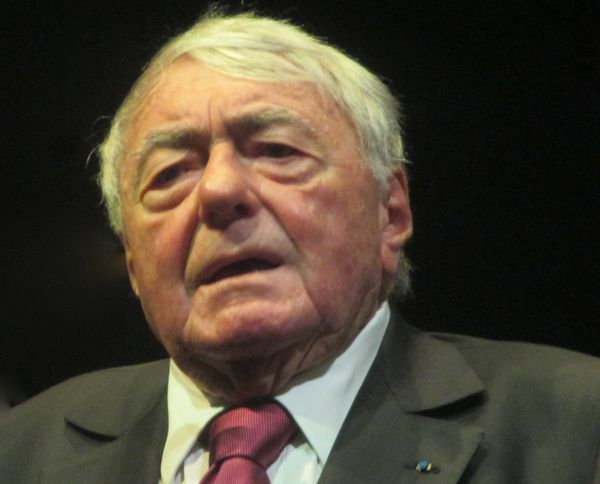 |
| David Frenkel on Claude Lanzmann: "He has like a sixth sense. I think that was maybe the most powerful tool when he was interviewing people during Shoah." Photo: Anne-Katrin Titze |
In the second half of my conversation with the producer of Claude Lanzmann's The Last Of The Unjust and The Four Sisters (Les Quatre Soeurs) at the Film Society of Lincoln Center during the New York Film Festival in 2017 David Frenkel shared with me some insight on Ada Lichtman in La Puce Joyeuse (The Merry Flea), Paula Biren in Baluty, Ruth Elias in Le Serment d'Hippocrate (The Hippocratic Oath), and Hanna Marton in L'arche De Noé (Noah's Ark).
The interviews of the four women were conducted by Lanzmann in the 1970s. Each one bringing to light the in-depth testimony of a remarkable woman who survived unspeakable horrors during the Third Reich. Their strength, their dignity and even joyfulness - their embrace of life, not death - is of an eternal importance beyond words.
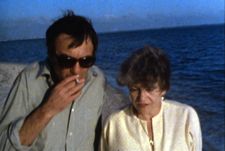 |
| Claude Lanzmann with Paula Biren in Baluty |
The Four Sisters World Premiere was screened in the festival's Special Events programme and the four films were theatrically released in France on July 4, the day before Claude Lanzmann passed away in Paris at the age of 92.
When I bring up Ada Lichtman in The Merry Flea to David Frenkel, he comments that Lichtman's husband, who silently sits next to her during most of the film, reminds him of a protagonist in the 2001 documentary by Claude Lanzmann, called Sobibór, 14 Octobre 1943, 16 heures, about the uprising of the Sobibór death camp in Poland. "They have the same look. He looks so powerful, so calm", says Frenkel.
Anne-Katrin Titze: There is no uniformity in the titles for the four individual films. All four women at one point say they lost everyone, their entire family. The title, The Four Sisters, suggests finding your family elsewhere out of necessity. The Hippocratic Oath brings us to the abyss, the center of all cruelty. The second one is named after the name of the Lodz ghetto.
David Frenkel: Exactly. Baluty.
AKT: The third one is a metaphor. Noah's Ark. A list of which ones make it.
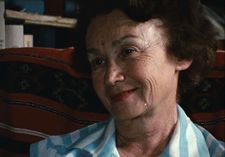 |
| David Frenkel on Hanna Marton's diary in L'Arche De Noé (Noah's Ark): "It reminds me of the notebook of Benjamin Murmelstein, which Claude has in his house." |
DF: Yes.
AKT: And The Merry Flea is a Nazi name.
DF: Exactly. There's also poetry in these titles. Claude is a filmmaker, he is a philosopher but he is also a poet.
AKT: During the interview in The Merry Flea, the woman is making dolls costumes while she is talking of the past. With her husband sitting silently next to her. Everything evolves slowly. We cannot read the man. Is he perhaps critical of what she says?
She is making a Little Red Riding Hood costume for a doll. Lost in the forest among wolves. The symbolism is there in the simplest form, in the doll. It's extremely brave to go this route, not explaining anything.
DF: That's what Claude does. She really had a dead voice, very monotone. She's very different from the three others, Ada Lichtman.
AKT: Less educated.
DF: Less educated. Even the way she dresses. And Claude very quickly was sort of asking her to sew.
AKT: He asked her to?
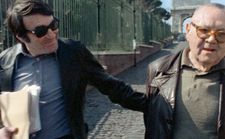 |
| Claude Lanzmann with Benjamin Murmelstein in The Last Of The Unjust |
DF: He asked her to do it. So that it would help her to tell her stories. And the man reminds me of a protagonist in a previous film by Claude Lanzmann, called Sobibór, 14 Octobre 1943, 16 heures about the uprising of the Sobibór death camp. They have the same look. He looks so powerful, so calm.
AKT: In Noah's Ark what stands out is the notebook. She, Hanna Marton, has this little notebook which looks inconspicuous, like my featherweight notebook. The timelessness of the object makes it shocking. A little Smythson diary you carry around with you and this dead husband of hers …
DF: … that you can see in the portrait!
AKT: Yes, like Laura or Rebecca. And she is looking through his calendar. Thinking of history like that! Flipping through his agenda! It reminded me of The Last of the Unjust where you have the physical evidence that transports you back in time.
DF: It reminds me of the notebook of Benjamin Murmelstein, which Claude has in his house. With Baluty, she [Paula Biren] was a police woman.
AKT: Claude's relationship to her is interesting. He starts by pushing her, stating "I want to put you off balance." And the flirtation at the beginning! She is a very beautiful woman.
![David Frenkel on Ada Lichtman sewing in La Puce Joyeuse (The Merry Flea): "He [Claude Lanzmann] asked her to do it. So that it would help her to tell her stories."](/images/newsite/Ada_Lichtman_225.jpg) |
| David Frenkel on Ada Lichtman sewing in La Puce Joyeuse (The Merry Flea): "He [Claude Lanzmann] asked her to do it. So that it would help her to tell her stories." |
DF: Yes, she's beautiful.
AKT: So he is flirting with her. We think, where is this going? He states that he wants her off-balance and later on he is pushing her. He wants more information. "Can I say it, if you can't say it?"
DF: And she says "No."
AKT: She says "No." It is so remarkable. He is an inspiration. He is a breathtaking interviewer.
DF: It's powerful.
AKT: How does he know when to push and when not to push, I often wonder. That's part of his genius.
DF: Claude is like an animal. As soon as you enter a room, he smells you. He knows how to act with you. He has like a sixth sense. I think that was maybe the most powerful tool when he was interviewing people during Shoah.
AKT: You completely forget how long ago these were filmed. The women are very much alive.
DF: No, age doesn't mark his work. And still it's maybe more important than ever to show these films.
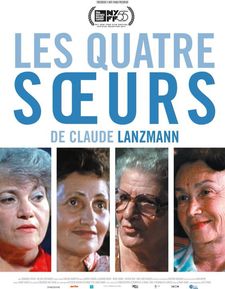 |
| Les Quatre Soeurs (The Four Sisters) poster |
AKT: It's an immense experience seeing the films. I mean, I write about films, I should be able to put it into words. But especially The Hippocratic Oath, I still don't know how to approach it. It is so unbearable. And it's not that I haven't been dealing with the subject.
I spoke on a panel at the Jewish Museum about their Mirroring Evil: Nazi Imagery/Recent Art exhibition [in 2002], I could write about The Last of the Unjust, but the interactions with Mengele recounted here [in The Hippocratic Oath] take my words away.
DF: She [Ruth Elias] is always so moving and strong.
AKT: She is so immensely strong, unbelievably strong. From the Shoah satellite interviews are there perpetrators as well? Are there Nazi interviews that haven't been turned into anything?
DF: Into a satellite film? I couldn't tell. I don't know.
Read what David Frenkel had to say on Claude Lanzmann and how The Four Sisters (Les Quatre Soeurs) developed.
Read Arnaud Desplechin's tribute in honour of Claude Lanzmann.





















